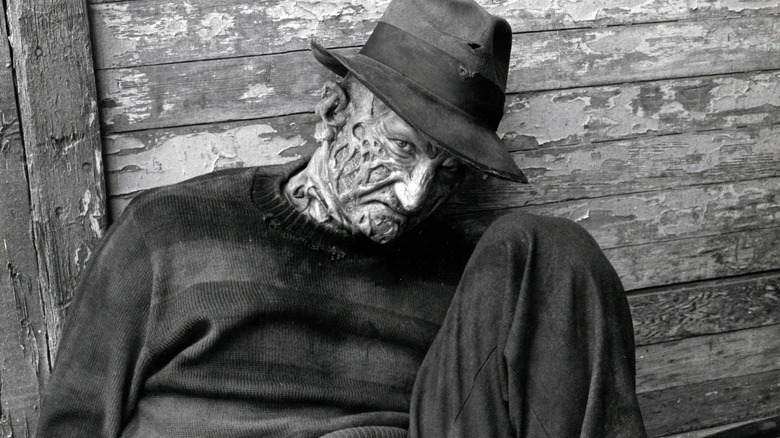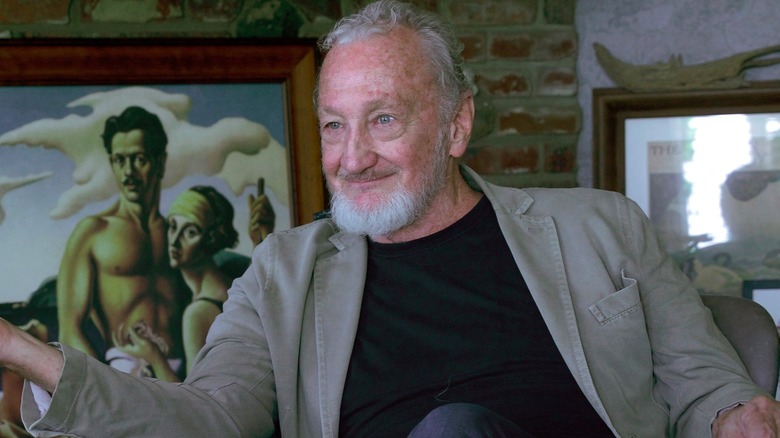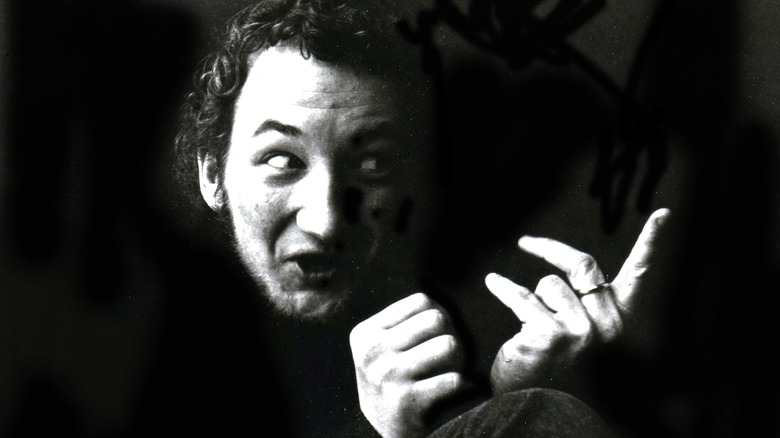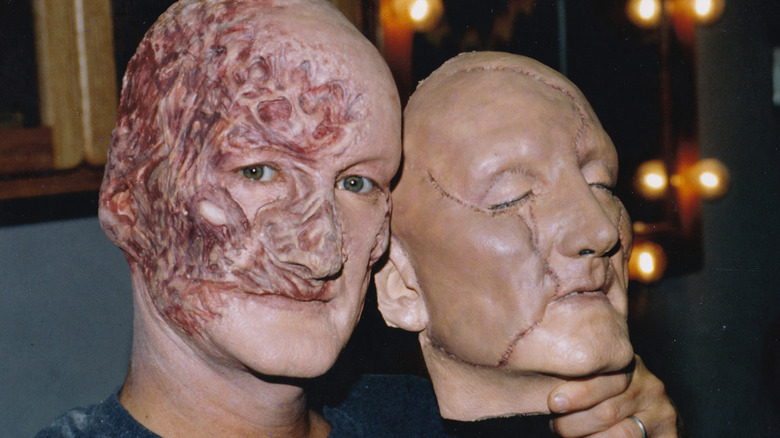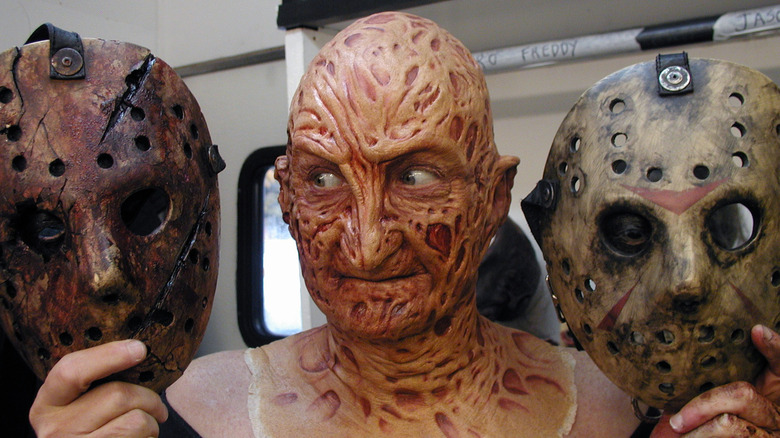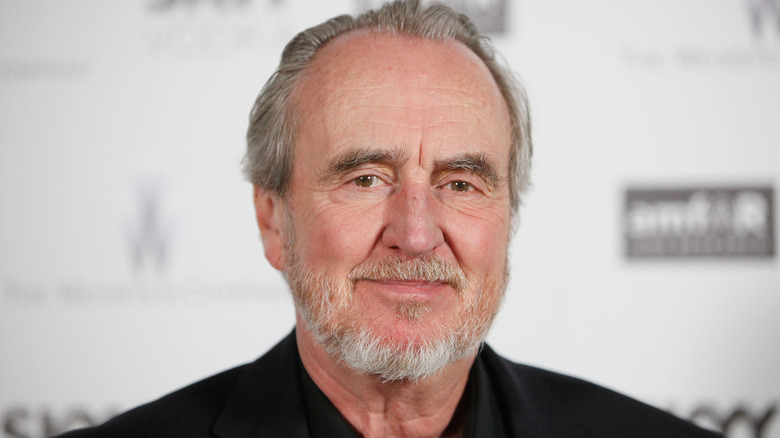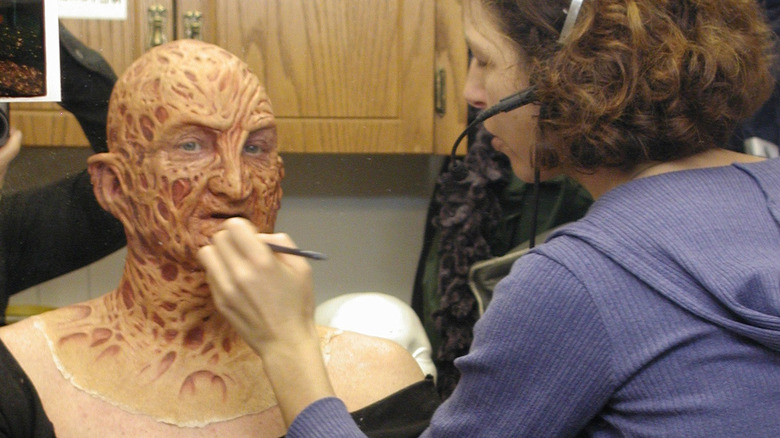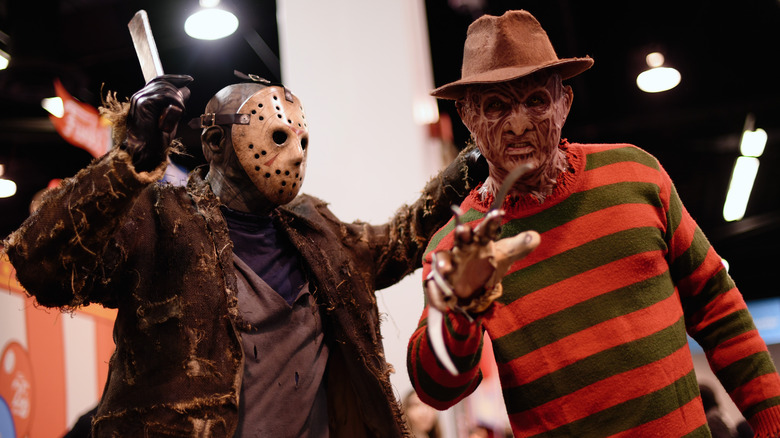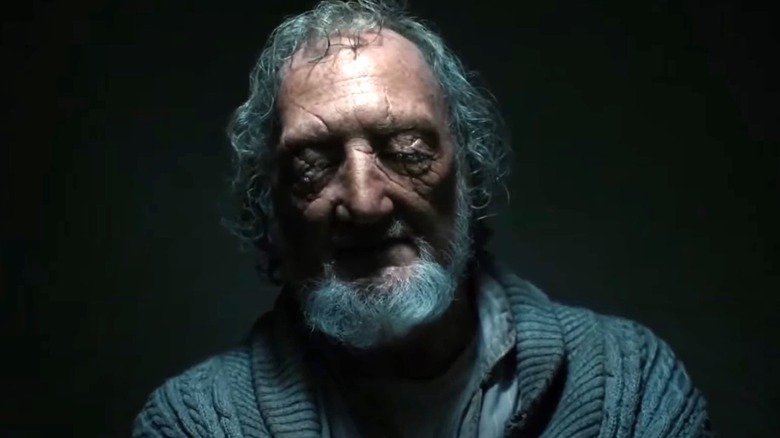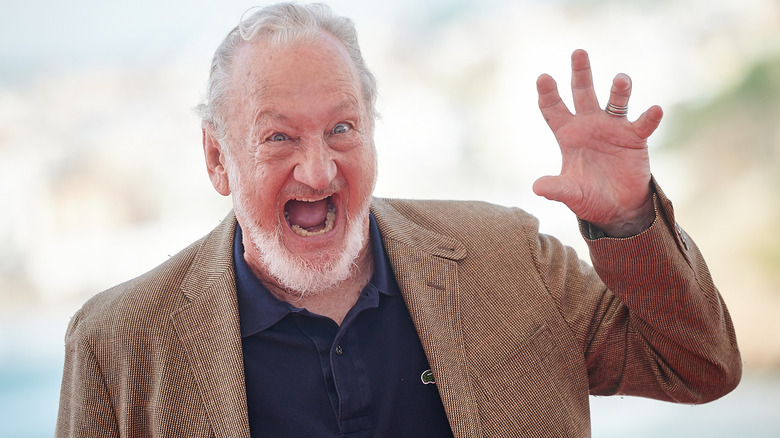Robert Englund Imagined Wes Craven As A Dark Genius Before Playing Freddy Krueger - Exclusive Interview
Most of the world knows and loves Robert Englund as the burnt-faced, blade-fingered Freddy Krueger in the "A Nightmare on Elm Street" franchise. Did you know he once played Pinocchio in a child's stage production, or that he once starred alongside Arnold Schwarzenegger?
These tidbits and more are featured in the new documentary "Hollywood Dreams & Nightmares: The Robert Englund Story." Shot over the course of two years, the project highlights the decades-long career of this acclaimed actor, covering everything from his early years playing the sidekick to becoming one of the top horror icons in pop culture. "Hollywood Dreams & Nightmares," released by Cineverse, features in-depth interviews with Englund, his wife Nancy Englund, fellow horror icon Kane Hodder, and more.
In an exclusive interview with Looper, Englund shares details on how the documentary became a reality, his first encounter with Wes Craven, and the name of the most welcoming person on the "Stranger Things" set.
Capturing a career of over 50 years
To start, I'd love to hear how this project came to be.
I'm approached a lot to narrate and do voiceovers for Freddy-centric documentaries or horror documentaries. I'm selective, but I do that. The guys from Cult Screening, Chris Griffins and Gary Smart, approached me and, within an hour or so, we all realized we're fanboys and we love movies, not just horror movies, even though those guys love horror, and popcorn movies and sci-fi and fantasy. We all love movies, and I realized these guys really had my back. If I forgot a famous character actor's name, like Herbert Lom from some Hammer film, and I was off digressing on an interview, they were right there. They were like having my own personal international movie database, computers right there in my ear. I felt secure. I knew, if I was digressing on a question or something, that they would prompt me and I could get back on subject.
I felt very secure with those guys, and they didn't really want to do a just-about-Freddy documentary, and not "Robert Englund, famous actor." It was more, I'm a guy, a character actor in Hollywood who survived for over 50 years, and the hills and valleys, the ups and downs, the dreams and nightmares. That tied in nicely with my successful horror franchise, because you have to surrender a lot of that stuff to the fans, as well. That's my biggest audience base, but we wanted to do this story of a character actor that survives and then, in the middle of his career, has this happy accident of becoming Vincent Price or Boris Karloff or somebody, which is what happened to me.
Quite the storyteller
What was it like, reflecting on your whole career in that capacity? I feel like it's not something a lot of actors get to do.
I have great stories and I've known that for the last five to 10 years. There's a point in time when I realized, "Oh my God, I starred in a movie with Henry Fonda and Jeff Bridges, and I worked with a silent screen star, Lillian Gish, and all these Oscar winners, and I was up for strange television shows that I thought were a matter of life and death, and now no one even remembers them." That's the body of a career, when you look back at it, no pun intended.
I realized I did have some fun stories and I did want to share them because, as you get older, you get a little wisdom and, some of that, you can share with fans and other people that want to get into the industry that need to know ... One of the best pieces of advice I ever got was someone said, "People say 'no,' you're rejected until they say 'yes,' and then that's your first movie, or your first starring role, or your first television series, or your first writing job or directing job."
It's always "no" until it's "yes," and you have to toughen yourself up and prepare for that, and learn to deal with that rejection. It's tough. I have friends that are far better actors than I would ever hope to be, and they never quite figured out how to audition or they couldn't deal with a rejection, and they didn't stick it out. They're really gifted, talented people. It's this certain luck of the draw and happy accidents that happen to one over the course of a career that help you survive.
From stage to screen
[My] apologies, it's thundering and lightning outside, not sure if you can hear it.
Yes I know, I'm your June gloom guest. [rubs hands together sinisterly]
Perfect ambience! Now, I love that you got your start on a theater stage. Do you think, if you didn't get that role of Pinocchio and those early stage roles, that you still would've found your way to film?
I don't know. I was a pretty all-American kid, and I was a champion swimmer, I was on the Little League, I wanted to be a gymnast, and I always sidekicked the cool older boys. I don't know how that worked out or why that worked out that way. It was a thing. Then, one summer, right on the cusp of adolescence, I followed this beautiful older girl into a semi-professional children's theater. As I say in the documentary, I thought I was going to be sweeping the stage and maybe [end up] being an usher. There were cute older girls hanging out that wanted to be actresses, and some of them became movie stars, actually. I auditioned and I wound up getting all the leading roles.
I think it was because I was a very precocious, advanced reader when I was young. It wasn't something I talked about, but I skipped half a grade or something back in the fourth grade because, not that the rest of me was smart, but I did have these almost extraordinary reading skills when I was a child. They called it reading comprehension, and that must have helped me out on my auditions.
What really, really got me hooked was getting that laugh in the same place every night, which is probably the great curse of the standup comic, too. It's such a wonderful high. It's like being a rock star when you can set yourself up for that great laugh. I did that originally with Pinocchio, and they talk about it in the doc, how I put these fake arrows in my butt and in my little Tyrolean Pinocchio vest. It had foam underneath the fabric, and I added arrows every night and the laugh got bigger and bigger. It's really a cheap shtick, but I loved it ... that's really what sealed the deal.
The making of Freddy Krueger
If we can skip ahead a little bit to Freddy Krueger ... unlike Michael Myers and Jason, who just walk and lurk about ...
Yeah, those guys don't have much personality.
Right! Well, Freddy does, and he's almost funny. I've even seen people compare him to Chucky with his over-the-top personality. Was that something that Wes Craven had in it from the beginning, or you implemented that?
No, Wes got a little angry with us when we exploited it in later sequels in the franchise, but that was always there. In [the original] "Nightmare on Elm Street," Freddy cracks jokes, he sticks his tongue out of a phone, he puts the girl's face on and pretends to be Tina [Gray] (Amanda Wyss). She sinks into the stairs, the stairs turn liquidy in her nightmare. Freddy's managing all of that. He has a wicked, cruel, clown sense of humor, which is a classic ingredient in theater and in storytelling — the cruel clown, Rumpelstiltskin — and that was always there. The fans loved it so much because it was evidence of Freddy's personality, that we did exploit it in later sequels. That was always part and parcel of the character.
Early thoughts on Wes Craven
When you first got the script for that movie, what were your initial thoughts on the character? Did you like it instantly, or it grew on you?
I had a vacancy in my schedule. I was having my first introduction to stardom on a television series that was an international hit. I was flying all over the world, and I was renegotiating my salary, and I was hanging out at a new wave bar in Hollywood on La Brea — it was called Blackies. You remember the new wave: big shoulders, big hair, skinny ties. This club was on the cusp of punk and new wave music. I used to be a bit of a day drinker in there at the end of the day, because it was close to my agent's office, and I would go by, drop by to see how I did on an audition and let them see me, and schmooze a bit in the office.
I remember they had two speakers, giant speakers, and giant old televisions suspended from the ceiling, the big old Sony Trinitrons in these metal boxes in the bar. I'd be in there having an Irish whiskey and flirting with a little punk rock bartender girl, and they would have this continuous loop on either end of the bar. One end was David Lynch's "Eraserhead" in black and white, and the other, in black and white because it was apparently a video loop, was Wes Craven's "The Hills Have Eyes" and scenes from "Last House on the Left."
So in my subconscious, I'd mixed David Lynch and Wes Craven together, and I was curious to work with Wes. I imagined him as a dark genius because of having a cocktail and watching clips from his films. When I heard he was directing this project, that was the hook that made me want to do the interview. I read the script, which was wonderful and dark and strange. Then, Wes recounted at the interview, this debonair guy in a Ralph Lauren outfit, he recounted the story to me and his vision of "Nightmare on Elm Street" and I was hooked. I really wanted to be in it.
Why A Nightmare on Elm Street continues to live on
What about the movie and the character do you think has kept it going? Parents are now introducing it to their kids.
We are the product of a very happy show business accident. We were a theatrical hit, then we were a huge video phenomenon, mom-and-pop video stores in the Blockbuster era, then we were a DVD phenomenon and Blu-ray, and the making-of, as well as being on cable every Halloween and marathons and things like that. [There were] also ... [new "Nightmare" movies coming out consistently from 1985 to 1994], and then the lag between "Wes Craven's New Nightmare" and then in [2003], "Freddy vs. Jason."
We covered this interesting period of time, '84 to 2004 ... and simultaneously, I didn't realize this at the time, but we were also in people's homes because the kids would get to rent a video on the weekend. Mom and Dad had watched "Pretty Woman" with Julia Roberts, the kids would come home with the new "Nightmare on Elm Street" movie and watch with glee as mother and father got scared, or stepdad got scared, or in some cases, the stepfather or dad would put silverware on his fingers and scratch the windows and scare the kids at night.
It actually became — and I've encountered this over the years — it was a family experience to watch this scary film with your family together, that you'd rent the video and stop it, and watch the scary bits over and over again, and pause it and heat the pizza up and go get a cold beer out of the refrigerator. Those factors — the video revolution, cable — those all aided and abetted the phenomenal franchise success of "Nightmare on Elm Street."
Meeting the fans
Now, you get to meet the fans at these conventions. Have you been doing those for a while?
At some point after "Freddy vs. Jason" in the mid-2000s, I began to take the conventions kind of seriously, because I realized how much incredible merchandising there was on the character. I'm not just talking about action figures, but extraordinary artwork, as well as all these creations by artists that have booths at these shows. Many of them do original artworks for one convention, so it's a limited edition. The fans that get those at that particular convention and then get a signature from someone from "Game of Thrones" or someone from "Lord of the Rings" or "Star Wars" or myself, it becomes a valuable piece of collectible.
That's fun for me. I'm working all the time, whether it's voiceover work on a cartoon, or the new little independent horror movie I have that's coming out, or guest starring on "Criminal Minds" or "Hawaii Five-O" or something. I like to check with the fans and get that feedback from anything new that I've done, especially if it's a game or a voiceover on an animated show, things that are new to me, to this old dog.
It's also great when I go to a con and somebody comes up with a picture of me and Henry Fonda in some old movie I did back in the '70s, driving a truck together, or somebody recently brought a picture of me in bed with Susan Sarandon from a movie I'd done back in the '70s, and a scene of me shooting pool with Jeff Bridges, and a picture of me with my shirt off with Arnold Schwarzenegger in some movie. I haven't seen those in 50 years, those photos, but it's not just Freddy. It's this old character actor career of over 50 years. It's really fun to see that stuff ... and when you get to be my age, it's fun, especially to see photos of yourself with a full head of hair.
Elm Street meets Eleven
I'm sure you've been introduced to a whole new generation now because of "Stranger Things." What was that like, entering that world in Season 4? Did anyone make you feel particularly welcome on set?
I'm a big fan of Millie Bobby Brown, and I had met her at a convention and I told her that she had this great movie star quality where she was able to listen in a closeup, like a great movie star, and you could see her thinking and could almost see shadows across her face. I was talking to her like she was a 25-year-old adult actress. A, I didn't know she was English, and B, I forgot she was a child back then. I was telling her mother to take her to see this Scarlett Johansson alien movie ["Under the Skin"], because they used that same effect with a shimmering black liquid floor. And then after I told her mother to take her to see that movie, I realized, "Oh my God, Scarlett Johansson's naked in that scene, Millie's a child."
I knew Millie and I was a fan of the series, and I didn't get a role in Season 3 that I tried out for, but they did bring me back for Season 4, Episode 4. It's a great role because I'm Vecna's (Jamie Campbell Bower) daddy — spoiler alert, but I think I can say that now, it's been out for a while. Millie made me feel really welcome on the set the first day in Atlanta. I got a Millie Bobby Brown hug. Millie's a superstar now, so that relaxed me. It was really fun to work with Maya Hawke. I'm a big fan of Maya's and Sean Levy. I think Sean Levy is like the new [Steven] Spielberg. This guy's amazing. He's so ahead in his thinking of everything. It's almost like he's the new kind of Hitchcock. And of course, the Duffer Brothers, the geniuses behind it, and the fact that "Stranger Things" is this wonderful salute to the '80s — and the '80s is sort of my decade — that also made it a very comfortable fit.
Hopefully we don't have to wait too long for the last season.
Yeah, Season 5. They've got to tie up a lot of loose ends.
New project alert
Was there anything else you wanted our readers to know?
I know, during the pandemic, I was down the rabbit hole on cable and streamers and I found a lot of great documentaries: rock and roll documentaries, historical and political documentaries, as well as show business stuff. I remember finding the Joanne Woodward, Paul Newman one. It's great because I love both those actors so much, but there's a lot of them out there. And on some rainy day, if the fans find "Hollywood Dreams & Nightmares," it's fun. It's fun to see what it takes to survive in Hollywood and watch my hair recede as the years go by.
I have a great little independent horror movie coming out called "Natty Knocks," directed by my "Phantom of the Opera" director Dwight Little.
"Hollywood Dreams & Nightmares: The Robert Englund Story" is now available on Screambox and Digital.
This interview has been edited for length and clarity.
